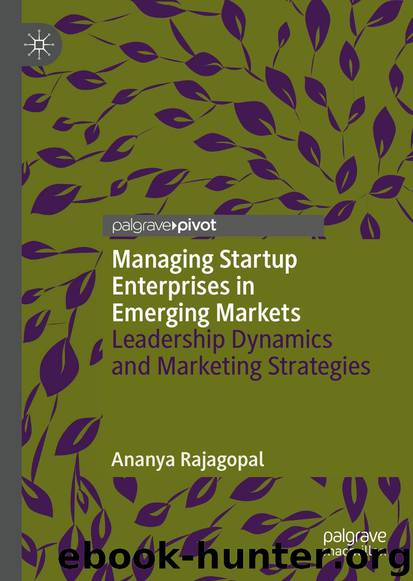Managing Startup Enterprises in Emerging Markets by Ananya Rajagopal

Author:Ananya Rajagopal
Language: eng
Format: epub
ISBN: 9783030281557
Publisher: Springer International Publishing
Keywords
Qualitative analysisEmployee opennessDecision-makingMarket competitivenessOrganizational performanceTeam cultureLeadership
Introduction
Qualitative research facilitates cognitive expressions through a systematic approach of information collection through predetermined and intercept questions within the perspectives of inductive theories. This is one of the preferred scientific methods to pursue information from the subjects within the scope of their applied knowledge. Therefore, the qualitative research process is based on interpretivism, which focuses on interpretations and drawing meanings on responses of the subjects and explores the attributes of human elements in an organization. This method has been found appropriate to interview entrepreneurial leaders by giving them liberal space to express their views on uniqueness and complexities of SUEs.
Initially 40 start-up enterprises were selected for obtaining organizational data and scheduling interviews with the entrepreneurial leaders. Over the first round of discussions, it was observed that some entrepreneurial leaders were in a fix to give appointment to schedule interviews. Upon conversation with the entrepreneurial leaders, it was explored that heads of organizations of eight SUEs expressed their reservations on attending to the interviews due to their personal reasons. Accordingly, the interviews were limited to 32 entrepreneurial leaders which constituted 80% of the pre-defined sample size. As per the schedule, qualitative research has been conducted through in-depth interviews in an informal scenario, which was comfortable to the respondents. Selection of respondents for qualitative research was based on the attributes of respondents, their convenience, and the purpose of the study. Sampling for qualitative research is not based on the probability proportion of the population. Data collection and analysis in qualitative research have been based on conducting in-depth interviews, documenting direct observation, and analyzing verbal and non-verbal information like written documents and images. Based on the sequential information on relevant questions across the respondents, thematic storyboards have been created to support the content analysis emerging out of qualitative information.
The interview process showed a mixed response with high and low inflow of information from the subjects. Therefore, during interviews, observations were jotted down, and semantic mapping of perceptions were drawn to support principal arguments of the respondents. During the interview process, focus was laid on verbal elucidations, facial interpretations, and interpretation of visual exhibits like charts and presentations. Some ambiguous responses of the entrepreneurial leaders led to circular reasoning and affected the process of drawing interpretations during the study. Circular reasoning needs some presumption to be made in search of right responses. Therefore, under such circumstances, a second appointment was taken to clarify the responses, which generated circular reasoning (Rips 2002). In the process of qualitative research, conversation pathways have been developed prior to setting the interviews with respondents by prioritizing the interview questions and their respective logical connectivity. Repeatability of information has been checked while retrieving the qualitative information periodically during the data collection process (Russell-Rose et al. 2018).
Critical self-scrutiny measures have been employed during the data retrieval process to protect the quality of information and reflexivity in responses. Therefore, a constant stock of information has been taken to filter the duplication in information and biases imbedded in the responses (Rajagopal 2019).
Download
This site does not store any files on its server. We only index and link to content provided by other sites. Please contact the content providers to delete copyright contents if any and email us, we'll remove relevant links or contents immediately.
The Black Swan by Nassim Nicholas Taleb(7113)
Bad Blood by John Carreyrou(6613)
Pioneering Portfolio Management by David F. Swensen(6291)
Millionaire: The Philanderer, Gambler, and Duelist Who Invented Modern Finance by Janet Gleeson(4471)
Skin in the Game by Nassim Nicholas Taleb(4240)
The Money Culture by Michael Lewis(4198)
Bullshit Jobs by David Graeber(4180)
Skin in the Game: Hidden Asymmetries in Daily Life by Nassim Nicholas Taleb(3993)
The Wisdom of Finance by Mihir Desai(3735)
Blockchain Basics by Daniel Drescher(3574)
Liar's Poker by Michael Lewis(3442)
Fooled by Randomness: The Hidden Role of Chance in Life and in the Markets by Nassim Nicholas Taleb(3112)
Hands-On Machine Learning for Algorithmic Trading by Stefan Jansen(3068)
The Intelligent Investor by Benjamin Graham Jason Zweig(3037)
Mastering Bitcoin: Programming the Open Blockchain by Andreas M. Antonopoulos(3036)
The Power of Broke by Daymond John(2977)
Investing For Dummies by Eric Tyson(2950)
You Are What You Risk by Michele Wucker(2794)
Market Wizards by Jack D. Schwager(2699)
